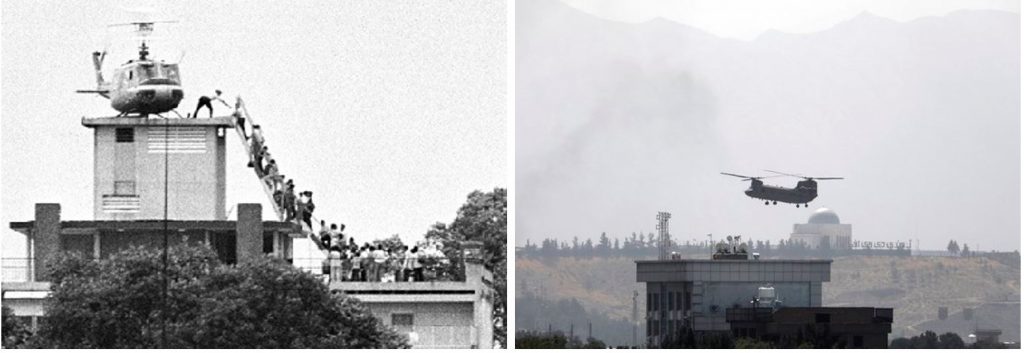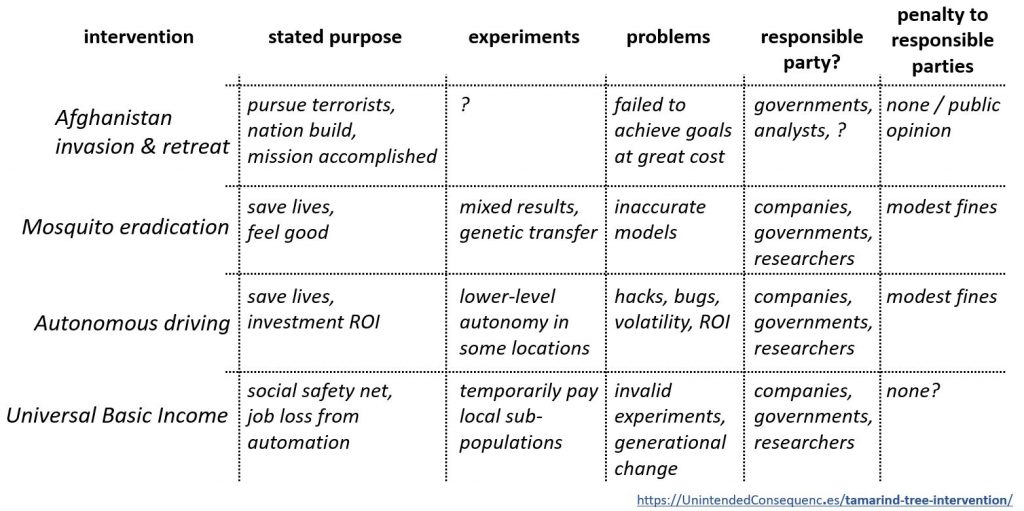These two scenes have been compared a lot recently.

A little known story about the one on the left is that a large tamarind tree grew on the US Saigon embassy compound. The US ambassador used the symbol of the tamarind tree to represent the solidity of US support for South Vietnam.
And in some ways, the April 1975 fall of Saigon (a scene known to be avoided by two generations of US politicians) was much like the August 2021 fall of Kabul turned out to be.
But here’s a recent “nothing to worry about” response in the month leading up to August 15th.
36 days ago, President Biden told the American people that the Taliban would not take over #Afghanistan after he ordered the removal of U.S. troops. pic.twitter.com/FiG5pWsyey
— POLARIS (@polarisnatsec) August 13, 2021
While here’s a “focus on the real mission” reposition.
Jake Tapper begins his interview with Secretary of State Antony Blinken with this question: "How did President Biden get this so wrong?" pic.twitter.com/XwpnlTIgfo
— Justin Baragona (@justinbaragona) August 15, 2021
And here’s a strange in-the-moment denial of reality.
The President is to be commended for the clarity of purpose of his statement on Afghanistan and his action. The Taliban must know the world is watching its actions. We are concerned about reports regarding the Taliban’s brutal treatment of all Afghans, especially women and girls.
— Nancy Pelosi (@SpeakerPelosi) August 15, 2021
Why does interventionism produce unintended consequences? Where should we temper our desire to intervene in a system, even a bad one?
I’ve written a few times about different kinds of interventions, including mosquito eradication, autonomous driving, and Universal Basic Income. None of these are mainstream (yet). What should we prepare for if they do become mainstream?

Malaria. Rationale for intervention: Malaria kills hundreds of thousands of people per year. Maybe we should eliminate mosquitos so that malaria won’t spread? Risk: How many die as a result of ecosystem impact and changed behavior from mosquito eradication? People will do this without oversight anyway. Alternate to intervention: pursue a vaccine instead.
Autonomous Vehicles. Rationale for intervention: Human drivers kill over 30,000 per year just in the US; optimize traffic flow. Bad data and need to generate ROI for investments. Risk: hacks, bugs could lead to large, sudden disruptions. Alternate to intervention: AV-only roads. Per mile driven tax to fund potential clean-up of AV system breakdowns.
Universal Basic Income: Rationale for intervention: social safety net; coming job loss from automation. Risk: difficult to model human behavior and over long time scales. Alternate to intervention: Better entrepreneurial and educational opportunities for job creation.
And to the situation in Afghanistan, what kind of systems did the US create there in support of the country’s future security?
From the Wall Street Journal on August 14th:
“The Afghan army fighting alongside American troops was molded to match the way the Americans operate. The U.S. military, the world’s most advanced, relies heavily on combining ground operations with air power, using aircraft to resupply outposts, strike targets, ferry the wounded, and collect reconnaissance and intelligence.
“In the wake of President Biden’s withdrawal decision, the U.S. pulled its air support, intelligence and contractors servicing Afghanistan’s planes and helicopters. That meant the Afghan military simply couldn’t operate anymore. The same happened with another failed American effort, the South Vietnamese army in the 1970s, said retired Lt. Gen. Daniel Bolger, who commanded the U.S.-led coalition’s mission to train Afghan forces in 2011-2013.
“‘There is always a tendency to use the model you know, which is your own model,’ said Gen. Bolger, who now teaches history at North Carolina State University. ‘When you build an army like that, and it’s meant to be a partner with a sophisticated force like the Americans, you can’t pull the Americans out all of a sudden, because then they lose the day-to-day assistance that they need,’ he said.”
Like the other models outlined above, Afghanistan was left with a weaker system when one element of it (US military support) suddenly left. If something like this happens in as high-profile a place as Afghanistan, how well should we feel about interventions in complex systems?
In order to bring in helicopters to evacuate thousands of people who had swarmed the embassy in Saigon, the US ambassador had to authorize felling that massive tamarind tree.
The US has cut down another tamarind tree in Kabul.